
BLOOD REVIEWS
Scope & Guideline
Exploring breakthroughs in hematologic and oncologic research.
Introduction
Aims and Scopes
- Hematological Malignancies:
The journal covers a wide range of hematological malignancies including leukemia, lymphoma, and myeloma, focusing on their biology, treatment strategies, and patient management. - Coagulation Disorders:
Research on various coagulation disorders, such as hemophilia, thrombocytopenia, and thrombotic conditions, is a key focus, including novel therapeutic approaches and management strategies. - Transfusion Medicine:
Exploration of transfusion practices, adverse reactions, and the evolving landscape of transfusion-related therapies, including the use of blood products and their clinical implications. - Immunotherapy and Targeted Therapies:
Significant emphasis on the development and application of immunotherapies, CAR T-cell therapy, and targeted treatments in hematological disorders, reflecting the shift towards personalized medicine. - Patient-Centered Care:
The journal highlights the importance of quality of life, patient preferences, and shared decision-making in treatment approaches for hematological diseases. - Emerging Technologies:
Coverage of innovative technologies such as artificial intelligence and genomics in the diagnosis and treatment of hematological conditions, aiming to integrate cutting-edge science into clinical practice.
Trending and Emerging
- Gene Therapy and Genetic Modulation:
There is a growing interest in gene therapy as a potential curative approach for various hematological disorders, including sickle cell disease and hemophilia, highlighting advancements in genetic technologies. - Microbiome and Hematology:
Research on the gut microbiome's role in hematological conditions is on the rise, exploring how dysbiosis may impact disease progression and treatment outcomes, indicating a shift towards understanding systemic influences on hematologic health. - Immunotherapy Innovations:
The emergence of novel immunotherapeutic strategies, including bispecific antibodies and checkpoint inhibitors, is a significant trend, reflecting the ongoing transformation in treatment paradigms for hematological malignancies. - Health Equity and Access to Care:
Increasing publications focus on disparities in hematological care, emphasizing the need for equity in access to innovative therapies, particularly among diverse populations. - Patient-Reported Outcomes and Quality of Life:
There is an increasing emphasis on patient-reported outcomes and quality of life measures in research, underscoring the importance of holistic approaches to patient care in hematology. - Artificial Intelligence in Hematology:
The application of artificial intelligence and machine learning in diagnostics, treatment personalization, and monitoring of hematologic diseases is an emerging theme, indicative of the journal's forward-looking approach.
Declining or Waning
- Traditional Chemotherapy Approaches:
With the rise of targeted therapies and immunotherapies, traditional chemotherapy approaches for hematological malignancies are discussed less frequently, as newer treatments gain prominence. - Basic Hematology:
Fundamental topics in hematology that do not directly relate to clinical or translational research are becoming less common, as the journal increasingly favors articles with direct clinical applications or innovative methodologies. - Epidemiological Studies:
While still important, epidemiological studies focusing on rare conditions or those with limited translational impact are less frequently published, as the journal prioritizes studies that offer immediate clinical relevance. - Classic Diagnostic Techniques:
The focus on traditional diagnostic methods is waning in favor of more advanced techniques, such as genomic profiling and machine learning applications in diagnostics. - Older Treatment Modalities:
The exploration of older treatment modalities, particularly those that have been largely replaced by newer therapies, is less common as the field moves toward more effective and innovative treatment options.
Similar Journals
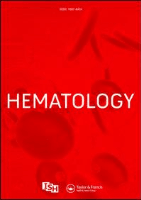
Hematology
Unlocking Potential: Pioneering Research in Blood DisordersHematology is a distinguished open-access journal published by Taylor & Francis Ltd, dedicated to advancing research and knowledge in the field of hematology. Established in 1996, the journal has continually evolved to meet the needs of a growing community of researchers and practitioners, providing a vital platform for disseminating innovative findings and clinical insights. With its impact factor reflecting a robust commitment to quality scholarship, Hematology has achieved a respectable position in its category as evidenced by its Q3 ranking in the Hematology category and ranks #85 out of 137 in the Scopus index, which positions it in the 38th percentile among its peers. The journal’s open-access policy, initiated in 2019, further enhances its reach and accessibility, allowing a broad audience of professionals, researchers, and students to engage with high-quality research without barriers. By covering a wide range of topics related to blood disorders, treatment methodologies, and emerging therapies, Hematology stands as an essential resource for those dedicated to innovation in this critical area of healthcare.
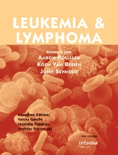
LEUKEMIA & LYMPHOMA
Leading the charge in leukemia and lymphoma insights.LEUKEMIA & LYMPHOMA is a prestigious peer-reviewed journal published by Taylor & Francis Ltd, focusing on vital research in the fields of hematology, oncology, and cancer research. With an ISSN of 1042-8194 and an E-ISSN of 1029-2403, this journal is recognized for its high-quality and impactful contributions to understanding blood cancers, with a notable impact factor reflective of its influence. Since its inception in 1989, LEUKEMIA & LYMPHOMA has continuously provided a platform for researchers and professionals to disseminate their findings, fostering advancements in diagnostic, therapeutic, and clinical strategies related to leukemias and lymphomas. The journal ranks in the Q2 category for both Hematology and Oncology research categories as of 2023, underscoring its commitment to excellence. The journal is based in the United Kingdom and serves a global audience, making it an essential resource for those dedicated to improving outcomes for patients with hematological malignancies.

Blood and Lymphatic Cancer-Targets and Therapy
Exploring New Horizons in Cancer TherapyBlood and Lymphatic Cancer-Targets and Therapy, published by DOVE MEDICAL PRESS LTD, is a vital open-access journal that has been disseminating crucial research and findings in the field of hematology and oncology since 2011. With its ISSN 1179-9889, this journal focuses on the latest therapeutic targets and innovative treatment strategies for blood and lymphatic cancers, contributing significantly to the advancement of knowledge and practice in this specialized area. Designed for researchers, healthcare professionals, and students alike, Blood and Lymphatic Cancer-Targets and Therapy aims to foster a deeper understanding of cancer biology and promote collaborative efforts leading to novel therapeutic interventions. The open-access model ensures that research findings are readily accessible to a global audience, underscoring the journal's commitment to enhancing patient care and fostering educational growth in the cancer domain.
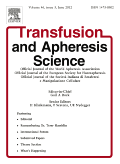
TRANSFUSION AND APHERESIS SCIENCE
Empowering Research for Enhanced Patient Outcomes in HematologyTRANSFUSION AND APHERESIS SCIENCE, published by Pergamon-Elsevier Science Ltd, serves as a pivotal platform for researchers and practitioners in the fields of hematology, transfusion medicine, and apheresis. With an ISSN of 1473-0502 and an E-ISSN of 1878-1683, this peer-reviewed journal boasts a respectable Q3 ranking in the Hematology category as of 2023, positioning it within the 45th percentile among its counterparts. Operating from the United Kingdom, it provides comprehensive insights into the latest advancements and methodologies in transfusion practices and apheresis technology, crucial for enhancing patient care and therapeutic strategies. The journal's scope, covering key developments from 1996 to 2024, allows for a deep exploration of historical and emerging trends within the discipline. Moreover, its open access options facilitate widespread dissemination of research findings, fostering collaboration and innovation in the scientific community. For those dedicated to advancing knowledge in hematology, TRANSFUSION AND APHERESIS SCIENCE represents an essential resource, bridging theory and practice in this vital area of healthcare.
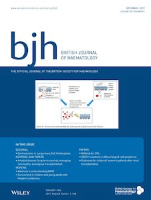
BRITISH JOURNAL OF HAEMATOLOGY
Exploring Innovations in Blood Health and DiseaseBritish Journal of Haematology, published by Wiley, is a leading journal in the field of hematology, with an impressive impact factor reflecting its significance in the medical research community. Established in 1955, the journal has consistently contributed to advancing knowledge in hematology, currently holding a prestigious Q1 ranking in the Scopus category of Hematology, placing it in the top 18% of the field. The journal encompasses a broad range of topics including clinical and laboratory aspects of blood disorders and hematological malignancies, making it an essential resource for hematologists, researchers, and healthcare professionals. With its commitment to publishing top-tier research and clinical studies, the British Journal of Haematology plays a critical role in shaping treatment approaches and improving patient outcomes worldwide. Please note that this journal does not offer Open Access options, ensuring that published content is rigorously curated for quality and relevance.
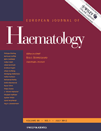
EUROPEAN JOURNAL OF HAEMATOLOGY
Connecting Experts in the Evolving Field of HematologyEUROPEAN JOURNAL OF HAEMATOLOGY, published by Wiley, serves as a vital resource for experts in the field of hematology, focusing on the latest advancements in blood disorders and therapies. With an ISSN of 0902-4441 and an E-ISSN of 1600-0609, this esteemed journal has been disseminating knowledge since 1986 and continues to thrive, converging its visionary approach through to 2024. Notably, it holds a distinguished Q2 ranking in Hematology and an impressive Q1 ranking in the broader category of Medicine (miscellaneous) as of 2023, highlighting its significant contribution to the scientific community. With a Scopus rank of #45/137 and a 67th percentile in the field, the journal is recognized for its rigorous peer-reviewed research, making it an indispensable publication for researchers, practitioners, and students aiming to stay at the forefront of hematological studies. Though not an open-access journal, it ensures broad accessibility to critical findings via its subscription model, thus fostering an informed and globally engaged audience.
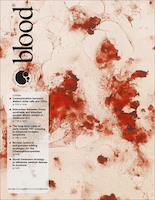
BLOOD
Empowering Research in Blood Disorders.BLOOD, published by the American Society of Hematology, is a premier peer-reviewed journal in the fields of Biochemistry, Cell Biology, Hematology, and Immunology. With an impressive impact factor and ranking in the top quartiles (Q1) across multiple disciplines, BLOOD is essential reading for researchers and professionals seeking to stay updated on the latest advancements in hematology and related fields. The journal has been a cornerstone of hematological research since its inception in 1946, providing a platform for rigorous scientific inquiry and discourse. Its commitment to publishing high-quality original research, comprehensive reviews, and insightful editorials makes it a vital resource for students, practitioners, and scientists alike. By offering exceptional access to influential publications, BLOOD continues to shape the future of hematology and enhance understanding of blood-related disorders, marking its vital role in advancing both basic and clinical research.

Journal of Hematology
Pioneering Discoveries in Blood HealthThe Journal of Hematology, published by ELMER PRESS INC, serves as a pivotal platform for disseminating cutting-edge research in the field of hematology. With an ISSN of 1927-1212 and an E-ISSN of 1927-1220, this journal is committed to advancing scientific knowledge and clinical practice through high-quality peer-reviewed articles encompassing all aspects of blood disorders, from basic science to health policy implications. While the journal currently operates under a traditional access model, it nonetheless prioritizes the rapid publication of significant findings, ensuring that researchers, clinicians, and students have timely access to the latest advancements in hematological research. Positioned to bridge gaps in knowledge and foster collaboration among scholars worldwide, the Journal of Hematology is an essential resource for anyone invested in this vital area of medicine.

HemaSphere
Championing open access to vital hematology research.HemaSphere, published by WILEY, stands at the forefront of hematology research, offering a vital platform for the dissemination of cutting-edge findings in the field. Since its inception in 2017 and official transition to Open Access in 2018, the journal has positioned itself as a leading conduit for high-impact research, maintaining a prestigious Q1 quartile ranking in the Hematology category as of 2023. Addressed in the United States at 111 River St, Hoboken, NJ, HemaSphere aims to foster a global dialogue among researchers, clinicians, and students by providing unrestricted access to high-quality content that encompasses clinical and experimental advancements. With an array of engaging articles, reviews, and commentaries, HemaSphere contributes significantly to the advancement of hematology, ensuring that critical knowledge is readily accessible to enhance patient care and innovative research. To explore the latest developments and breakthroughs in this dynamic field, we invite scholars, professionals, and students to engage with HemaSphere and elevate their understanding of hematologic science.

Indian Journal of Hematology and Blood Transfusion
Illuminating the Path in Hematology and Transfusion PracticesIndian Journal of Hematology and Blood Transfusion, published by SPRINGER INDIA, serves as a leading platform for disseminating original research, reviews, and case studies in the field of hematology. With an ISSN of 0971-4502 and E-ISSN 0974-0449, this journal has been instrumental in advancing knowledge from 2000 to 2024, providing insights into critical issues surrounding blood disorders and transfusion practices. Currently ranked in the Q3 category for Hematology for 2023, it reflects a commitment to high-quality scientific content amidst a competitive landscape where it ranks 97/137 in Scopus for Medicine - Hematology, placing it in the 29th percentile of its peers. The journal primarily addresses a diverse readership, including researchers, healthcare professionals, and students, aiming to foster innovation and collaboration within the field. Although it operates under a subscription model, access options for individual articles and institutional subscriptions ensure that valuable research is disseminated widely to enhance medical practice and education in hematology.